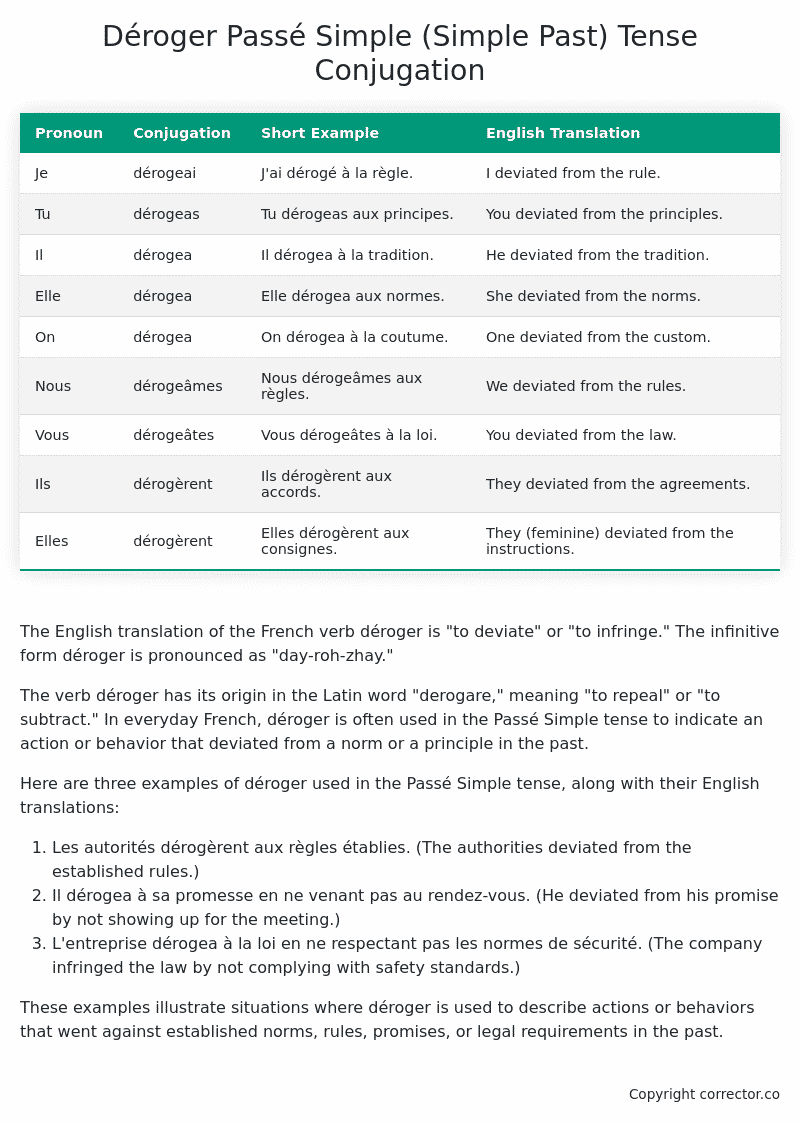Passé Simple (Simple Past) Tense Conjugation of the French Verb déroger
Introduction to the verb déroger
The English translation of the French verb déroger is “to deviate” or “to infringe.” The infinitive form déroger is pronounced as “day-roh-zhay.”
The verb déroger has its origin in the Latin word “derogare,” meaning “to repeal” or “to subtract.” In everyday French, déroger is often used in the Passé Simple tense to indicate an action or behavior that deviated from a norm or a principle in the past.
Here are three examples of déroger used in the Passé Simple tense, along with their English translations:
- Les autorités dérogèrent aux règles établies. (The authorities deviated from the established rules.)
- Il dérogea à sa promesse en ne venant pas au rendez-vous. (He deviated from his promise by not showing up for the meeting.)
- L’entreprise dérogea à la loi en ne respectant pas les normes de sécurité. (The company infringed the law by not complying with safety standards.)
These examples illustrate situations where déroger is used to describe actions or behaviors that went against established norms, rules, promises, or legal requirements in the past.
Table of the Passé Simple (Simple Past) Tense Conjugation of déroger
| Pronoun | Conjugation | Short Example | English Translation |
|---|---|---|---|
| Je | dérogeai | J’ai dérogé à la règle. | I deviated from the rule. |
| Tu | dérogeas | Tu dérogeas aux principes. | You deviated from the principles. |
| Il | dérogea | Il dérogea à la tradition. | He deviated from the tradition. |
| Elle | dérogea | Elle dérogea aux normes. | She deviated from the norms. |
| On | dérogea | On dérogea à la coutume. | One deviated from the custom. |
| Nous | dérogeâmes | Nous dérogeâmes aux règles. | We deviated from the rules. |
| Vous | dérogeâtes | Vous dérogeâtes à la loi. | You deviated from the law. |
| Ils | dérogèrent | Ils dérogèrent aux accords. | They deviated from the agreements. |
| Elles | dérogèrent | Elles dérogèrent aux consignes. | They (feminine) deviated from the instructions. |
Other Conjugations for Déroger.
Le Present (Present Tense) Conjugation of the French Verb déroger
Imparfait (Imperfect) Tense Conjugation of the French Verb déroger
Passé Simple (Simple Past) Tense Conjugation of the French Verb déroger (You’re reading it right now!)
Passé Composé (Present Perfect) Tense Conjugation of the French Verb déroger
Futur Simple (Simple Future) Tense Conjugation of the French Verb déroger
Futur Proche (Near Future) Tense Conjugation of the French Verb déroger
Plus-que-parfait (Pluperfect) Tense Conjugation of the French Verb déroger
Passé Antérieur (Past Anterior) Tense Conjugation of the French Verb déroger
Futur Antérieur (Future Anterior) Tense Conjugation of the French Verb déroger
Subjonctif Présent (Subjunctive Present) Tense Conjugation of the French Verb déroger
Subjonctif Passé (Subjunctive Past) Tense Conjugation of the French Verb déroger
Subjonctif Imparfait (Subjunctive Imperfect) Tense Conjugation of the French Verb déroger
Subjonctif Plus-que-parfait (Subjunctive Pluperfect) Tense Conjugation of the French Verb déroger
Conditionnel Présent (Conditional Present) Tense Conjugation of the French Verb déroger
Conditionnel Passé (Conditional Past) Tense Conjugation of the French Verb déroger
Conditionnel Passé II (Conditional Past II) Tense Conjugation of the French Verb déroger
L’impératif Présent (Imperative Present) Tense Conjugation of the French Verb déroger
L’impératif Passé (Imperative Past) Tense Conjugation of the French Verb déroger
L’infinitif Présent (Infinitive Present) Tense Conjugation of the French Verb déroger
L’infinitif Passé (Infinitive Past) Tense Conjugation of the French Verb déroger
Le Participe Présent (Present Participle) Tense Conjugation of the French Verb déroger
Le Participe Passé (Past Participle) Tense Conjugation of the French Verb déroger
Struggling with French verbs or the language in general? Why not use our free French Grammar Checker – no registration required!
Get a FREE Download Study Sheet of this Conjugation 🔥
Simply right click the image below, click “save image” and get your free reference for the déroger Passé Simple tense conjugation!

Déroger – About the French Passé Simple (Simple Past) Tense
Formation
Usage
Narration
Historical Context
Interactions with other tenses
Passé Composé
Imparfait
Conditional and Subjunctive
Summary
I hope you enjoyed this article on the verb déroger. Still in a learning mood? Check out another TOTALLY random French verb conjugation!


